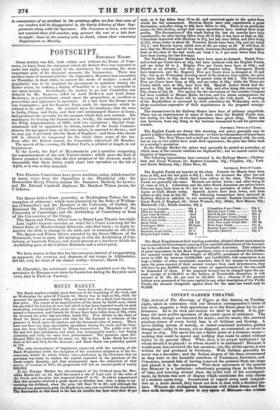POSTSCRIPT.
SATURDAY NIGHT.
Great anxiety was felt, both within and without the House of Com- mons, to learn from the statement which Sir Robert Peel was expected to make last night, what would be the machinery for executing the most important part of his financial measure, the Income-tax. There was another cause of unusual activity : the Opposition Members had assembled on Thursday, in their clubs, to concert the mode of warfare : a stock of popularity was to be acquired for investment in agitation during the Easter recess, by making a display of hostility to a tax so unpopular as one upon income. Accordingly, the motion to go into Committee was delayed by Mr. BARING, aided by Lord HOWICE and Lord JOHN RUSSELL, in a preliminary attack upon the proposition, as needless in peace-time and oppressive in operation. At a late hour the House went into Committee; and Sir ROBERT PEEL made his statement, which he refused to do until then. He retorted upon his assailants, that the wars In India, China, and Syria, and their own mismanaged finance at home, had produced the necessity for the measure which they now resisted. His machinery for levying the Incbme-tax is, briefly, the machinery used by the Whig Administration of 1806, with two exceptions : Special Com- missioners will be appointed, by whom, instead of the Local Commis- sioners, the tax-payer may, at his own option, be assessed to the tax ; and he may pay it privately into the Bank of England : and those who choose will be allowed to compound for the whole three years of the tax. Soon after Sir Robert ceased, the Committee adjourned till Monday.
The speech of the evening, Sir Robert Peel's, is printed at length in our Supplement.
In the Lords, the Earl of MALMESBURY put a question respecting the commencement of the new Timber-duties ; which gave the Earl of RIPON occasion to state, that the slow progress of the measure made it impossible that those duties GOUld Celliq into operation on the 5th of April, as it was at first intended.


















































 Previous page
Previous page